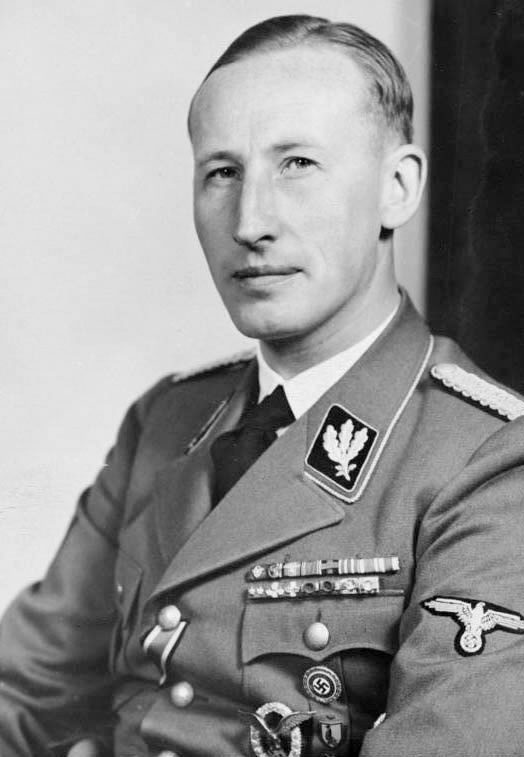Reinhard Heydrich: The Young Evil God of Death

Like all the most ambitious people, Reinhard Heydrich was a collector of titles: SS Obergruppenfuehrer, Head of the SD, Head of the Prussian Gestapo, Head of Gestapo for the Reich, Head of the Sicherheitspolizei, Head of the Reich’s Main Security Office, and Reich Protector of Bohemia and Moravia. He also collected several unofficial sobriquets: the Hangman, The Butcher of Prague, Himmler’s Brain, Himmler’s Evil Genius, The Man with the Iron Heart, The Blond Beast, and (perhaps most memorably) The Young Evil God of Death.
The internal politics of Nazi Germany operated according to the law of the jungle. Nazis were expected and encouraged to seize opportunities for advancement, preferably by the most ruthless and radical means. In such an environment it’s easy to see why Reinhard Heydrich soared to the top.
Heydrich’s first job upon joining Heinrich Himmler’s SS was to build the Sicherheitsdienst, the SD. Its remit was to gather intelligence about anyone considered a potential threat to Nazi power, including figures within the Nazi party itself. From this, Heydrich built up files on everyone in the Nazi power structure, and even the most senior Nazis feared what Heydrich might do with them. When Himmler and Goering wanted to dispose of SA-Chief Ernst Roehm, it was Heydrich who falsified the evidence that convinced Hitler that Roehm was planning to move against him. This action demonstrated Heydrich’s ruthlessness and solidified his hold over a new toy: the Gestapo.
Now Heydrich had both intelligence gathering and political police power in his hands. In the coming years, Heydrich would unleash this power on what remained of the political opposition–communists, socialists, liberals, Catholic politicians, and students. His methods were more subtle than those of the SA, which often resorted to pubilc beatings and killings. Under Heydrich, victims generally just heard a knock on the door and vanished. Their beatings and killings took place later, in private.
In June of 1936, the month in which The Summer of Long Knives is set, Hitler granted control of all the Reich’s police forces–including the previously non-political uniformed police and criminal investigator division (Kripo) to Heinrich Himmler, who made Heydrich the head of the newly created SiPo (a fusion of the ordinary police and the Gestapo) in addition to his position as head of the SD. Over the next three years, Heydrich would reorganize his office so that all police entities and intelligence agencies in his purview operated out of one office: the RSHA, the Reich’s Main Security Office. Not long after the Berlin Olympics, Heydrich, who’d already effectively crushed political opposition, turned his interest to new targets: the Jews, the Roma, and homosexuals (particularly male homosexuals). Though the Kristallnacht (the Night of Broken Glass) was suggested by Goebbels and approved by Hitler, it was Heydrich who handled the details of the massive pogrom, coordinating police, the Gestapo, the SA, concentration camp officials, and firemen. 20,000 Jews were arrested and sent to concentration camps in the days following Kristallnacht. Historians peg this as the beginning of the Holocaust, an crime in which Heydrich was so involved that following his assassination in Prague in 1942, the mass killings in Poland’s death camps, which Heydrich had organized, were renamed Operation Reinhard as a tribute to him.
What was Heydrich like personally? Outside of his job, he was fiercely competitive at sports, including skiing, fencing, and tennis, and apparently he was a sore loser. Though he was physically formidable, he had a relatively high-pitched voice that embarrassed him. Few recordings exist of Heydrich speaking in public. Rumors, which it was dangerous to breathe once Heydrich achieved power, suggested Heydrich’s possible Jewish ancestry. He had few genuine friends, which given his job and personality is understandable. He was a womanizer both before and after his marriage, but the only thing that was able to relax him was music. Heydrich was an accomplished violinist who often moved his listeners to tears with his sensitive interpretations of classical music. One acquaintance of Heydrich’s said that the only time his stony and suspicious expression softened was when he held the violin and the bow.
Heydrich’s deeds are too many to be given proper analysis here. The U.S. Holocaust Museum provides a tidy summary of his full career. And this biography, Hitler’s Hangman, is for anyone who wants to delve deeper.
Next week: Wilhelm Frick.
3 thoughts on “Reinhard Heydrich: The Young Evil God of Death”
Comments are closed.